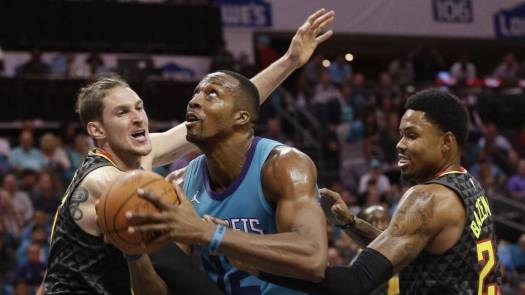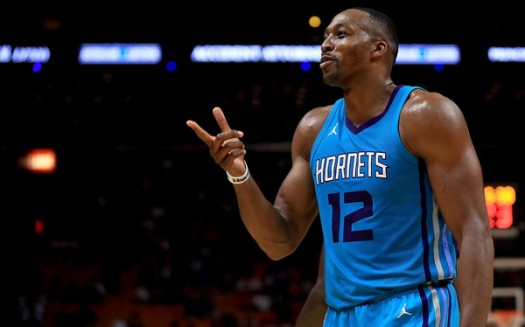This past off-season, the Atlanta Hawks practically begged anyone to take on Dwight Howard’s contract. In order to trade Howard to Charlotte, the Hawks had to throw in their 31st pick and take on Miles Plumlee’s albatross contract in return. Reportedly, Hawks players “jubilantly cheered into their cell phones” upon hearing the news of the trade. The writing was on the wall for Howard, with all signs pointing to the former 3x DPOTY and 2011 MVP Candidate becoming a relic of a bygone era that modern basketball has blown by.
In today’s NBA, the traditional back-to-basket big is extinct. More often than not, if a big can’t provide three-point shooting, they had better provide the three Rs in order to see time on the court: rebounding, rim-protection, and rim rolling. Dwight Howard has been notoriously slow to accept this reality, and his constant asking for unnecessary post touches and low-effort blown switches on defense have contributed to unceremonious exits out of his past three teams. However, this season, that’s changed — Howard seems to be finally finding his way.

Over the last 7 matches, Howard is posting 19.2 points to go along with 12.2 rebounds and 1.2 blocks (numbers which include his anomalous game against the Heat in which he had to sit a majority of the game due to foul trouble). His season has featured a smattering of 20 point – 10 rebound games (7!), and Howard’s recent 25 point – 20 rebound outing against Minnesota’s Karl-Anthony Towns serves as an exclamation point of sorts: “Hey look at me,” it seems to say, “I’m playing good basketball again!”
Defensively speaking, Howard has put forth much more effort this season and has returned to form as a solid rim protector. The Hornets’ best 5-Man line-up through 22 games, albeit in limited minutes, is an uber-defensive Howard-Williams-MKG-Batum-MCW lineup, which has posted a net rating of 18.6. Offensively, the group is nothing particularly interesting; however, on defense, the group is only allowing a stingy 84.6 points per 100 possessions. The versatility of this group is a big part of it. Dwight Howard acts as a rim protector in the middle, a safety net for the wing defenders, while the rest of the line-up can switch everything defensively. Batum and Carter-Williams can switch onto anyone from the 1 through 3, Williams can switch onto forwards and centers, and Kidd-Gilchrist can switch onto just about anybody. So while the Hornets’ versatile forwards are pestering opposing offenses with their switching abilities, Howard can patrol the paint and act as a deterrent to driving guards and lurking big men.
On the offensive side of the ball, Howard has also shown improvements. The game is increasingly moving towards small ball line-ups, meaning Howard can feast on the league’s litany of smaller power forwards-turned-centers. Normally small ball line-ups that can draw Howard out to the 3-point line would render Howard BBQ-Chicken on defense, however Charlotte has the luxury of possessing quite a few forwards and guards who can switch everything. This means they can, in a way, insulate Howard and minimize his defensive weakness, while in the meantime Howard gets access to easy put-backs and deep post positioning on smaller centers.

But whilst Howard has been able to improve in these regards, there remain’s one nagging problem: 4 years later and Howard is still obsessed with post-ups. Howard’s post touches have been a point of contention in nearly every stop he’s made along his career. The fundamental problem time and time again has been that Howard demands that he gets them when he’s just quite simply not a good back-to-the-basket player. This year, Howard is averaging nearly double the amount of post-up possessions per game when compared to his season in Atlanta, and at 6.5 per game he has the third most in the league behind only LaMarcus Aldridge (7.5) and Joel Embiid (10.4). For comparison, Dwight is averaging more post-up opportunities than Blake Griffin, Anthony Davis, DeMarcus Cousins, Hassan Whiteside, Karl-Anthony Towns and Kristaps Porzingis.
Of players who average at least 3.0 post-up possessions per game this season, Howard ranks second to last in the NBA in points per possession, at 0.77 Points per Possession. For someone who is averaging the third most post-ups per game, you would hope he would at least score on these possessions at a better rate than his current abysmal rating. I would look for Steve Clifford to hopefully curtail the frequency of these possessions as the season goes on.
However, Howard has made a killing this season catching the ball deep in the post and turning into the basket, like in this play here. Howard’s physicality and imposing size make plays like these incredibly effective against small-ball centers (see: his 20 and 14 game against Kevin Love last Friday). Once he starts dribbling and trying to use post-moves, that’s where the problem starts.

The problem with Dwight is that he’s always yearned to be something he’s not and has always refused (weirdly enough) to play to his strengths. Even back in his Los Angeles days, Dwight refused to run the pick and roll with Steve Nash and Kobe, instead complaining that he was not the focal point of the offense and insisting he get post-up touches. Howard shouldn’t have been focal point of that offense back then during his prime, and he certainly shouldn’t be that for the Hornets now — but he could be an excellent cog in a well oiled offensive system if he only allowed himself to be and bought into it.
Take DeAndre Jordan for example. Jordan knows what he is, and he thrives because of it. A steady diet of rolls to the basket, putbacks, and stuffed lobs keeps Jordan engaged offensively without the entire system revolving around him. Jordan doesn’t demand that he get possessions in the post because he knows that he’s not good at it; instead he thrives in his role by playing to his strengths. In today’s NBA, that’s what it takes to be a successful traditional big: playing to the strengths of your niche and being star in your role. Dwight could be like a super charged version of DeAndre Jordan, but only if he allows himself to be.
I suppose that’s what makes all of this so captivating. We are witnessing a man fighting against the tides of time to wrestle the relevance of his craft from his clutches. The ground upon which Howard based his game is being pulled out from under him, swept away by the quicksands of modernization. But whether he realizes it or not, the way to survive — as with any struggle to survive modernization in the world — is to adapt.


